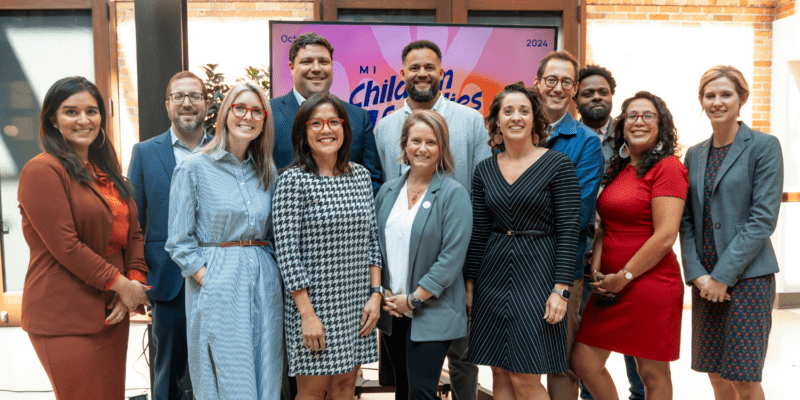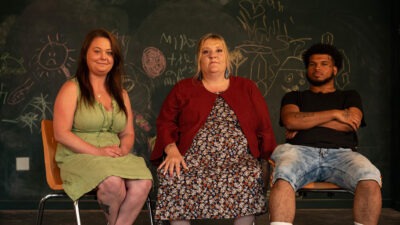At this fall’s inaugural Michigan Children and Families Summit, dozens of community members came together to discuss issues that impact families and children in Michigan and find solutions to improve their lives.
The summit boldly pledged: “to collaborate and lead in this space, by facilitating conversations between those who work in the child and family space and those who work in the policy space every day.”
Steelcase Foundation President Daniel Williams kicked off the day with an invitation to question the ways people impacted by policies are centered in the decision making process.
“What do these changes feel like for them, day in and day out?,” he said. “We have really high level data points that we build intervention around but what we lose is the felt difference for families,”
When individuals who are most affected are not taken into consideration, said Williams, policy changes can end up doing more harm than good.
“For example, increasing minimum wage might seem like the right approach to addressing income instability for a particular population, but if we are not considering how this increase could affect, say, these families’ access to childcare subsidies, then the wage increase might not have the impact we think it could,” he added.
That began a day of learning, moderated by policy experts, government officials and nonprofit sector leaders.
The event attracted dozens of nonprofit leaders and community members, which Williams noted as evidence of how eager community leaders are to engage in solution-focused work.
Joe Waters is the co-founder and CEO of Capita, a think tank dedicated to exploring how cultural and social transformations affect children and their families. He offered insight on hows a lack of systemic support for families can directly contribute to increasing anxiety, stress, depression and loneliness.
“Fifty percent of parents in Michigan say they are overworked and feel really stressed and 29% say that the lack of good quality child care is affecting their mental health,” Waters explained.
Access to childcare is not just about having a safe place parents can take their children while they are working, but it’s also a critical support that parents need, he added.
According to the Kids Count 2024 report from the Michigan League of Public Policy, the state is missing out on nearly $3 billion in economic activity each year due to insufficient childcare. In other words, parents across Michigan are choosing to forgo economic opportunities because they either cannot afford childcare or cannot find accessible care in their communities.
The stress and anxiety of struggling to meet basic needs is felt not only by parents but also by their children. In a recent report from Harvard’s Graduate School of Education, nearly 40% of teens surveyed reported being “somewhat worried” about the mental health of at least one of their caregivers.
That worry for some teenagers is also translating into real-life experiences of anxiety and depression. According to the Harvard report, 19% of teens reported suffering anxiety and 15% said they struggled with depression.
During the pandemic, federal relief funds were allocated to support mental health services in Michigan schools, but those funds have since been depleted. Concurrently, the state’s budget for fiscal year 2025 has reduced school mental health services by over 90%.
In Michigan alone, nearly 14% of children struggle with anxiety or depression.
“Through our work across the country and in the recent data we have seen, the alarm bells are ringing quite loudly that we need to act now to reverse the trajectory we are on as a society,” said Waters. “If we work together to own this, we can and will make a difference for everyone across Michigan and across America.”
Emphasizing care in broader terms was one possible solution offered to attendees, whether its creating centers of care for both children and elder or passing police that funds child care and public and elder care.
“By 2040, one in six Americans will be over 65 years old,” said Elliot Haspel, Senior Fellow at Capita. “There’s some real opportunities that we have now and we’ve already seen this in other cultures around the world that have shown us that intergenerational efforts can create solid connectivity.”
Efforts have to beyond the individual data local to provide solutions, offered Tracie Coffman, Program Officer at the W.K. Kellogg Foundation.
“It’s about taking those data points and transforming them into solutions centered by families,” said Coffman. “The systems that most affect young children – food, health, education and the economy – are not working for everyone.”
Coffman is not wrong, in fact, 13% of Michiganders were living on income below the federal poverty line with more than 31% of residents paying more than 30% of their income on housing costs, according to data from the University of Michigan’s Poverty Solutions.
As part of the event, Coffman moderated a panel with elected officials that included U.S Representative Hillary Scholten and Kent County Commissioner Stan Steck as well as State SEnate Majority Leader Winnie Brinks to discuss what issues they are working on addressing.
Scholten shared she’s been advocating the Child Online Safety Act, a bill that aims to protect children from harmful online content and experiences. If passed, the bill would require social media platforms to disable addicture features and allow users to opt out of personalized recommendations.
“Michigan is fortunate to have philanthropic leaders invested in affecting change to broad systems that often feel impossible to move,” said Scholten. “As elected officials, we have a responsibility to take the knowledge gleaned from this summit forward in support of large-scale systems growth designed to benefit Michigan families.”
Kent County Commissioner Stan Steck explained to participants how county officials have been collaborating to address the shortage of behavioral health services for youth in West Michigan by supporting a pilot pediatric psychiatric urgent care clinic.
“We have done a lot of work to address behavioral crisis response for adults but we haven’t yet addressed it for adolescents,” he added. “That is an issue we need to prioritize so that we can be thoughtful about how we provide that service for young people who are going through a behavioral crisis,” added Steck.
The Pine Rest Pediatric Behavioral Center, is expected to be completed by fall of 2025 and is expected to provide care to an additional 3,000 children and families per year for in-patient needs.
Steck sees the center as an example of the ways collaborations can function effectively to address a systemic problem.
Over 70 people attended the Michigan Children and Families Summit, hosted at ICCF Community Homes, a housing access nonprofit in Grand Rapids.




















Comments